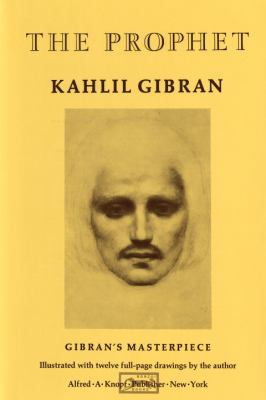
The Prophet, one of the most notorious book of the 20th century, written by a man from a distant land from that of the United States, but one that is too common to me. This man's name was Khalil Gibran, and he hails from the land of Lebanon, a small Arab country on the coast of the Mediterranean, with a history as long as human civilization and the diversity of people of a New York City street. Understanding Lebanon's demographics is crucial to understanding The Prophet, because the book include references to Judaism, Christianity, Sunni, Shia and Sufi Islam and various other religions, in which many are prevalent in Lebanese society. Gibran uses allusions to ancient literature in his writing to add a poetic effect to his writing and the combination of the different beliefs is one that is reflected by Gibran in this book and his general beliefs.
The story itself is quite a simple one and is told from the perspective of a man named Almustafa or “the prophet” who is boarding a ship that will take him home, after being on the island of Orphalese, a fictitious land, for the 12 years of his life. Before he boards the boat he is confronted several groups of people. These people are seeking knowledge, advice and want to hear great stories. This leads to the 26 chapters of the book about life and the human condition, with topics ranging from love, to marriage, to crime, to food, etc. Each topic is a new chapter and these chapters act as sermons by Almustapha and it is generally believed that views of Almustapha are directly correlated with those of Gibran himself, using the main character to show the beliefs of himself.
These views generally involved the ideals of freedom, and this is very reflective in his writings- for example when Almustapha is speaking of children he says “your children are not your children. They are the sons and daughters of Life's longing for itself.” The idea you are supposed to grasp from this statement is that, everyone amongst us is our brother and sister and the idea of anyone but life owning you, or controlling you is fallacious and it is damaging to the human soul. This ties in with Gibran's belief with religion as he was someone who was not necessarily always in favor of the structure of organized religion but the scripture that occupies the Quran and the Bible. That we should all look for our own meaning of religion and try and push that instead of one powerful man's idea, overarching all. This was reflected again when on religion he said “I love you when you bow in your mosque, kneel in your temple, pray in your church. For you and I are sons of one religion, and it is the spirit.” This again attempting to show that he has a love of humans, and the different behavior they occupy, and sees that mass outbreak of thousands of belief system has a beneficial thing to a healthy society.
My thoughts on this book is that it was quite compelling to see someone preach love and acceptance of others on a mass level. In a time where people from around the world are interacting at an even greater level, however the understanding for each other has dropped. It is always encouraging to see the promotion of not just freedom in name, but the application of freedom in practice and that true freedom is to not be attacked for a belief system, but to garnish that belief system and make it into your own. Khalil Gibran's views, speaking as a Lebanese person, find its roots in Lebanese society, as despite the sectarian divides that have turned the country upside down at times. There is often an encouragement of the idea of being Lebanese apart from anything else, and that the love of the different ethnicities and religions of Lebanon, and the world in general is how we succeed.
I would give this book a solid 8.5/10 as despite the fact, it was an excellent book I tend to be more of a non fiction reader, so the abstract words of poetry are not always as appealing to me, however it was important to read words by a man so acclaimed especially from my home country. I hope I am able to read more of his work, and would love to be able to get into more poetry and expand my horizons beyond the majority of my reading which is historical.